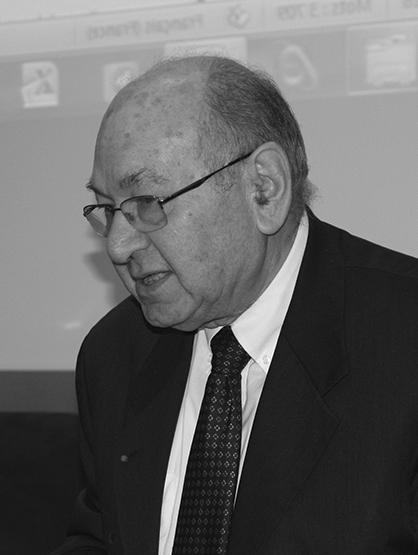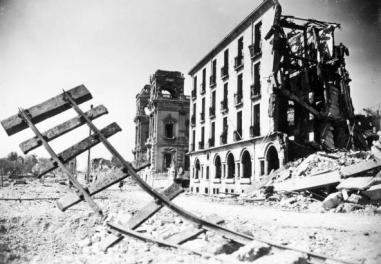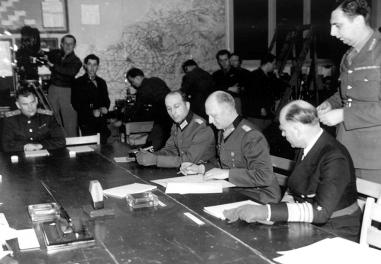Serge Berstein
Former teacher at the IEP in Paris, this specialist in the political history of contemporary France looks back at the nature of the Vichy regime and sheds light on the political and institutional choices that were available to the French after the Liberation.

Should the Vichy regime be considered fascist? In what intellectual and political genealogy can it be placed?
At its outset, the Vichy regime was a hotchpot of all those willing to accept the disappearance of the Republic, of the parliamentary regime and civil liberties in favour of a reactionary, authoritarian, corporatist and nationalistic regime that excluded Jews and immigrants from the national community and persecuted Freemasons. These are men representing all political trends from the right and also, to a smaller extent, from the left. Initially, the regime clearly lies in the orbit of a Maurras type far-right that inspired its 'national revolution' ideology. It was really only from 1943, under pressure from Joseph Darnand and his militia, that the regime took on a distinctly fascist appearance. These seeds were already present but not exclusively in the earlier phases of an authoritarian regime repudiating all the values of liberal democracy.
Can memory, a medium and object of history, guarantee historical accuracy?
Memory and history cannot be confused and, in some respects, there is a form of antinomy between them. The further a historical event recedes back in time, the more the concrete reality in which it occurred tends to disappear leaving only an impoverished trace that is often instrumentalised and erected as a value-bearing model (whether positive or negative), all the more easily accepted by public opinion since the public do not know or have forgotten the context of the event. In itself, the study of memory is of historical interest, but it obviously cannot replace the work of historians who, from multiple sources, strive to restitute the truth, not only in terms of facts, but of the time and the society in which they occurred, without neglecting to put them in perspective over a time frame that exceeds and assimilates them.
Many controversies regularly erupt in the world of research and in French society at large once the second World War and the Occupation is mentioned (French origins of fascism, the role of Vichy in the final solution, controversy over the battle of Glières for example...). How do you view these discussions?
These debates are useful if they can dispel interpretations inspired by political, philosophical or ideological options more than by historical analysis based on the rigorous critical methods that I have just mentioned. Yet the research areas you mention are precisely those where the scientific approach to history is frequently undermined by the three major errors that lead to a distorted vision of history, a priori value judgments , reverse determinism or outright anachronism. There may only be discussions by exchange of arguments based on the analysis of original sources, in the specific context of the period concerned and by observing the behaviour of men at the time in question and not on the basis of their past, and especially not their future.
After the fall of the Vichy regime arose the question of the political recovery of the country. What choices are available to the French?
France liberated in 1944-1945 is in a legal and political vacuum. Administered by General de Gaulle's provisional Government, it no longer has a constitution since that of the IIIrd Republic was suspended on 10 July 1940 by the French Parliament. It is in this context that General de Gaulle proposed to the French on 21 October, 1945 to decide in a referendum whether to maintain or reject the Constitution of the IIIrd Republic and in the latter case, to vote on a political organisation for the period during which a possible constituent assembly would draw up a new constitution. While the French voted 96% in favour of institutional change, only 66% of them approved the political organisation proposed by General de Gaulle which limited the duration and powers of the Constituent Assembly.
October 21, 1945, the French elect a new Constituent Assembly. What political forces are in place? What majority came out of these elections?
Simultaneously with the referendum, parliamentary elections were held on October 21, 1945. However this election, in which women participated for the first time, marked the collapse of the Government parties of the third Republic. By contrast nearly three quarters of voters gave their votes to three political parties who could claim to have played an important role in the Resistance, the Communist Party, the Socialist SFIO party and the Christian Democrat Popular Republican Movement (MRP). For the first time in the political history of France, the two Marxist parties, the Communists and Socialists, obtained an absolute majority in seats (302 of 586).
When did Gaullism cease to be simply a synonym of 'Resistance' to become a political project and current?
It was on 7 April, 1947 that political Gaullism was truly born with the announcement by general de Gaulle of the creation of a movement, the Rally of the French People (RPF), the core of the programme of which concerned the revision of the institutions of the 4th Republic. The general strongly condemned them in his speech in Epinal on 22 September, 1946, on the grounds that they give most power to the Parliament. He opposed this with the political project he proposed on 16 June, 1946 in his speech in Bayeux limiting Parliament to a legislative and budgetary role and making the President of the Republic the corner stone of the institutions.
What is Gaullism?
It is difficult to define because is not a political theory as such and also because its history is made up of episodes the continuity of which is not always clear. Between the Gaullism of the Resistance during the war years, the Gaullism in opposition under the 4th Republic, the Gaullism in power during the years when the general presided over the destiny of the country, or even the post-gaullism supported by its self-appointed heirs after 1969, there is much more than simple nuances in terms of differences. However, if we stick to the years in which general de Gaulle played a historical role, it seems that we can discern two permanent and prominent features that characterise Gaullism: the will to maintain and ensure the greatness of France and the need, to achieve this result, to found a strong state capable of taking initiatives to demonstrate this greatness. Apart from these two major elements, all other policy aspects are based on pragmatism, the criterion that determines whether they will be adopted or not lies in whether or not they serve the fundamental objective. Gaullism will therefore be at once interventionist then liberal as regards the economy, attached to the integrity of the Empire then a force for decolonisation, ally of the United States then determined to come out from under its wing... These fundamental features of Gaullism ensure it is clearly part of the genealogy of French nationalism, but a nationalism made unanimist in the wake of the First World War, accepting democratic and republican principles and repudiating the excesses and desire to exclude of the Maurrassians who preached for integral nationalism.
On 20 January 1946, General de Gaulle resigned from his position as head of Government. What did he expect from this crisis and what caused it?
The election of the Constituent Assembly on 21 October 1945 opened up a period of tension between de Gaulle and the major political parties that dominated parliament. During the war, and then after the Liberation, the general led, free of any control, all the various governmental bodies of free France, then fighting France and finally the provisional Government of the French Republic, in the name of the legitimacy that he drew from his historical role and his charisma. Yet now he is face to face with deputies elected by universal suffrage and who can claim democratic legitimacy that they derive from their status as representatives of the sovereign people. The general had no patience for the numerous criticisms of his decisions by deputies or even attempts by them to impose their views. On 21 December 1945, infuriated, he hinted that he would abandon power if the deputies continued to seek to dictate their law to the Government. Moreover, he was bitter that the deputies on the Constitution Committee carefully keep him away from their debates. When he asked the rapporteur of this Committee, the MRP deputy François de Menthon to inform him of how the work was going, he came up against a refusal, on the grounds that since he was not a deputy, it was not his business to be informed. Thus, his resignation on 20 January 1946 was intended to start a crisis by informing public opinion of his disagreement with the parliament, convinced that the reaction of the French would force the deputies to call him back, thus enabling him to impose his views on the constitution. However nothing of the sort happened. Public opinion observed his departure with calm. After a few days, de Gaulle went to Colombey. Now his break with the 4th Republic was total.
On 13 October 1946, the French adopt the IVth Republic. What is the new power organization? What are the new institutions?
The Constitution adopted by referendum on October 13, 1946 is the result of a compromise between the three parties dominating the Constituent Assembly. All three agree to a political system based on the preponderance of Parliament, which stands as the guarantee of the democratic nature of the institutions.
While the National Assembly elected for 5 years is not the single chamber desired by Socialists and Communists, it is the privileged custodian of universal suffrage. It fully controls its agenda, the duration of its sessions, it alone passes bills and cannot delegate this authority, it invests and overthrows governments. Faced with this pre-eminence of the National Assembly, the two counterweights introduced by the MRP party pale in comparison.
The Council of the Republic, appointed by a complex system combining nomination by the groups in the National Assembly and second degree elections by major voters, is practically limited to just giving its opinion that the National Assembly is not obliged to take into account. In all, its influence is so low that the system can be considered as being a single chamber one. The president of the Republic, elected for seven years by Congress bringing together both houses has only very limited powers. However, the duration of the presidential mandate, his president's knowledge of the issues, his exclusive right to appoint the president of the Council in fact give him real room for manoeuvre in a political system where no party has an absolute majority, any more than an indisputable leader of a majority coalition.
The fact remains that among the public authorities, the National Assembly remains the only decisive power under the 5th Republic. Although the constituents took some precautions to enable the Government to have real power over the Assembly, the resumption of 3rd Republic practices meant they remained a dead letter. In fact, it is the Assembly that invests the Government formed by the president of the Council appointed by the head of State. Throughout its existence, the Government is subject to permanent control by the National Assembly which may turn it over at any time either by passing a motion of censure or by refusing to accord it its confidence. On the other hand, the Government has virtually no control over the Assembly since, while the dissolution of the Assembly is indeed provided for, it is subject to conditions so draconian that its implementation appears highly unlikely (in fact, the 4th Republic was dissolved once, on 2 December 1955, by the Edgar Faure Government, the conditions, simplified in 1954, having been met a little by chance). In all, the Constitution of the 4th Republic establishes a single chamber system for the benefit of a virtually omnipotent National Assembly.
Despite an unstable government, the reconstruction of the country is to the credit of the IVth Republic, accompanied by numerous social advances. What were the key steps? What is the legacy of the IVth Republic?
We must be wary of the very dark view that the 5th Republic had of the republic preceding it. Of course, the dual opposition to the regime from the Communists and the Gaullists forced its followers on both left and right to form alliances resulting in immobility and impotence due to the opposing views of the protagonists. But it did not prevent the beginnings of a decolonisation, albeit a painful one, the founding acts of European construction, France's adhesion to the Atlantic alliance. The IVth Republic was able to instigate, thanks to the action of the State, the recovery of the French economy through nationalisations, planning, directing investments towards the key sectors of the economy. Finally, its social result is considerable, marked by the setting up of the Social Security system which, on the basis of the principle of national solidarity, provides safeguards against the vagaries of existence.
Read more
Le monde entre guerre et paix, 1945-1973, tome 2, coll. Initial Hatier, 1995.
Articles of the review
-
The file

The reconstruction
Disenchantment followed the days of collective joy at the time of the Liberation. France emerged bruised and battered by years of war and occupation: high toll in human lives, cities destroyed, a devastated economy and on-going rationing. Numerous challenges were now facing the country. ...Read more -
The event

Reims, May 7, 1945. The German surrender
Read more -
The figure

The Red Army: final offensives
From the defence of Moscow to the victories of Stalingrad and Kursk, from Smolensk to the Black Sea, from the Vistula to the Oder, to the march into Berlin..., the great patriotic war conducted by the Red Army sealed the fate of the Reich heralding the emergence of a new superpower.
Read more

